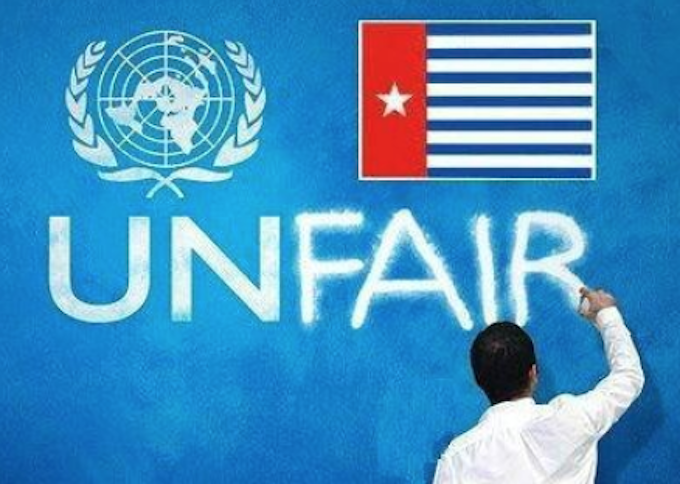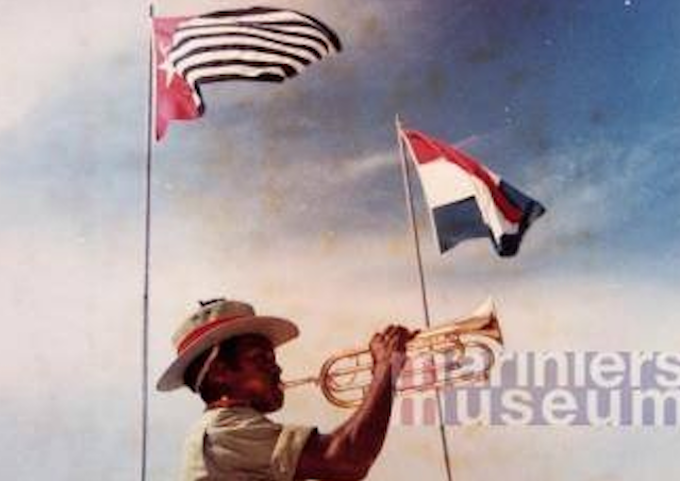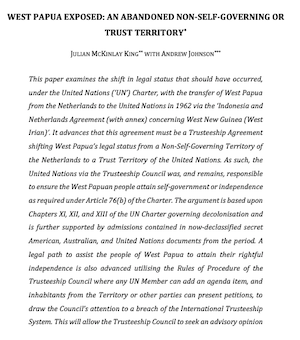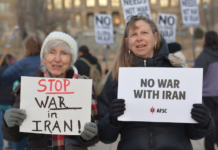
COMMENTARY: By Yamin Kogoya
Sixty years ago today — on 15 August 1962 — the fate of a newly born nation-state West Papua was stolen by men in New York. The infamous event is known as “The New Agreement”, a deal between the Netherlands and Indonesia over West Papua’s sovereignty.
A different fate had been intended for the people of West Papua in early 1961 when they elected their national Council from whom the Dutch were asking guidance for the transfer of administration back to Papuan hands.
Shockingly, the threat of colonialism came from America several months later when a journalist advocating liberty denounced a secret Washington proposal to betray America’s Pacific War ally Papua to an Asian colonial power.
The Council’s response was to present to the Dutch a flag and manifesto of independence asking all the peoples of West Papua to unite as one people under their new Morning Star flag.
On 1 December 1961, the Dutch raised the Morning Star flag, and for more than 60 years the people have united as one raising their Morning Star flag.
But declassified American records reveal horrific deceptions. A group inside the White House had begun secret negotiations with the Republic of Indonesia around a proposal for an illegal use of the International Trusteeship System, or to quote the US, “a special United Nations trusteeship of West New Guinea” that irrespective of Papua’s objections would then ask Indonesia to assume control.
The “special” nature of the US proposal had the opposite intent than that of the international law. The International Trusteeship System, Chapter XII of the United Nations Charter is meant protect a people’s right of independence and have the UN prepare annual reports about their welfare and progress towards independence for each territory the United Nations has become responsible for, including those invaded and subjugated by UN troops.
West Papua is both.
Instead of protection and annual reports, the United Nations by omission of duty is enabling Indonesian impunity for military campaigns of terror and administrative suspension of all human rights.
West Papuans have suffered hundreds of thousands of extrajudicial deaths, disappearances and looting of many hundreds of billions of dollars throughout the UN appointed administration by Indonesia.
Weekly stories of horror hidden from international news media by an ongoing Indonesian declaration that Papua is a quarantine zone requiring special permission for NGOs and journalists to enter.
It is beyond time that the UN took steps to put right the wrongs of the past. #selfdetermination pic.twitter.com/vsWBO0wXpo
— Free West Papua (@FreeWestPapua) August 7, 2022
Fiscal and geopolitical deceptions
Every principle written into the UN’s charter, the Rules of Procedure of the Trusteeship Council, and even Indonesia’s own New York Agreement have been violated by the ongoing Indonesian conduct, international mining and United Nations omission of lawful conduct.
These events proceeded against the backdrop of a global movement calling for decolonialisation that rippled across Asia, Africa and the Pacific, with the West and the Communist bloc supporting or opposing one another to gain influence in these movements.
The newly independent nation of Indonesia, which had been under Dutch rule for more than 300 years, declared independence on 17 August 1945. Sukarno was the man of this era, leading the outburst of a long-awaited human desire for freedom and equality.
In the same era, wars broke out in Korea and Vietnam; the world endured the Cuban missile crisis as forces of the West and the Communist bloc continued to clash and reshape the destiny of these new nation-states.
Leading up to the final recognition of their new republic in December 1949, Indonesians experienced another brutal, protracted war with the Dutch. The Netherlands side wanted to reclaim their past colonial glory, and the Indonesian side wanted to removed Dutch occupation and authority from their nation.
Indonesia’s founding fathers, Sukarno and Suharto, were significant men of their era, with ambitions to match — ambitions that led to the massacre of millions of alleged Indonesian Chinese communists in the mid-1960s; the same ambition that placed the Papuan people on the path they are on now, carved by blood, tears, trauma, war, killing, rape, exploitation, betrayal, and being cheated at every turn by the world’s highest institutions.
Many nations around the world had to face difficult choices, with emerging leaders of all types avoiding the cause of their own imagined nation-state. This was a most turbulent era of development and globalisation.
Arguably, most conflicts around the world today stem from unresolved grievances brought about by this turbulence and divisive historical events.
West Papua’s extended conflicts for the last 60 years are a direct result of being mishandled by Western forces who sought to take Papua’s independence for themselves.
As of today, Indonesians (and those unaware of West Papua’s legal status under international law) think that this is a domestic issue, a narrative which Jakarta elites insist on propagandising to the world.
The truth is that West Papua remains an unresolved issue with international implications. More specifically, the UN still has the responsibility to correct their sixty-year-old mistake.
The UN breached its own charter
At least in principle, all 111 articles of the UN Charter are aimed at promoting peace, dignity, and equality. One of the key elements of the charter (in relation to decolonisation) is its declaration that colonial territories would be considered non-self-governing territories. The United Nations’ responsibility was to provide a “full measure of self-government” to those nations colonised by foreign powers. West Papua’s story as a new nation began within these international frameworks.
West Papua was already listed under the UN’s decolonisation system as a non-self-governing territory before 1962 and the Dutch were preparing Papuans for full independence in accordance with the UN charter guidelines. The public has been deceived by trivialising this agreement and downplaying it as simply two powers — Netherlands and Indonesia — fighting over West Papuan territory.
The UN, as a caretaker of this trust, had a responsibility to provide a measure for Papuans to achieve independence. The UN instead handed (abandoned) this trust to Indonesia, who then abused that international trust by invading West Papua in May 1963. This scandalous historical error has brought unprecedented cataclysm to Papuans to date.

The Indonesian perspective
Most Indonesians have been fooled by their government to think that West Papua’s fate was decided during a referendum, known as “Pepera” or “Act of Free Choice” in 1969, which Papuans now refer to as the “Act of No Choice”. Indonesians assume that Indonesian occupancy is good for West Papua, but this is not true: they are unaware that Indonesia is illegally occupying West Papua and their government is in breach of many international laws.
It seems that the Western powers have no issue turning a blind eye when one of their endorsed global players are breaking their laws.
During the period of July to September 1969, the Act of Free Choice was carried out by the Indonesian government. The UN was there but did not act or speak against it. This referendum was one of the items stipulated in the New York Agreement seven years earlier.
About 2025 Papuan elders among the one million Papuans who were handpicked at gunpoint and forced to say “yes” to remain with Indonesia. The UN acted as a bystander, unwilling to interfere with the tyranny taking place before them.
What we seem to forget is the fact that before the referendum in 1969, Indonesia had already launched a large-scale martial and administrative operation throughout West Papua, instilling fear and setting the stage for the rubber stamp referendum to proceed.
What happened in 1969 was a tragedy and a farce of human autonomy. The UN and international community betrayed West Papua on the world’s stage.
The New York Agreement
Andrew Johnson and Julian King, Australian researchers who specialised in this case, have argued that West Papua is still a non-self-governing territory, and that Indonesia has no legal or moral right to claim sovereignty over West Papua. These researchers insist that West Papua is still a non-self-governing territory, and Indonesia is only there temporarily as an administrator — they have no legal basis to introduce any law or policy towards West Papua.
In their ground-breaking seminal work West Papua Exposed: An Abandoned Non-Self-Governing or Trust Territory, Johnson and King conclude that:
Either as a Non-Self-Governing Territory or a Trust Territory, the legal rights of the people of West Papua have been denied with every UN Member responsible and legally bound to uphold the Charter in order to correct this breach of international law.

No Papuan was invited or included during the agreement. This act itself speaks volumes – the complete denial of Papuans’ intrinsic worth as human beings to have any input into their fate is the basis for all kinds of violence, abuse, torture and mistreatment towards Papuan people.
This is the first violation and the most egregious because the Indonesian government’s draconian policies towards Papuans have consistently exhibited and reinforced this prejudiced behaviour over the past 60 years. Indonesians do not treat Papuans as equal human beings, therefore, what Papuans think, desire and feel doesn’t matter.
It was the right move for the UN to accept West Papua as a Trust Territory. However, the UN abandoned this sacred trust to Indonesia a year later, even though Indonesia’s behaviour prior to, during, and after this agreement had already been in breach of many UN charters and principles.
For example, Chapters 11 (XI), 12 (XII), and 13 (XIII) of the UN Charter governing decolonisation and Papua’s right to self-determination, as specified in the New York Agreement’s Articles 18 (XVII), 19 (XIX), 20 (XX), 21 (XXI), and 22 (XXII) have not been followed.
Additionally, the UN’s failure to uphold its principles and its silence on its disastrous mistake constitutes a serious breach of international law.
Secret documents
Declassified documents from the United States, Australia, and the United Nations reveal irrefutable evidence of what went wrong behind the scenes prior to, during, and after the Netherlands-Indonesia agreement.
The idea of exploiting the UN Trusteeship system to transfer the sovereignty of West Papua to Indonesia was already proposed in 1959 by the US embassy in Jakarta.
Now-declassified document titled “A proposal for Settlement of the West New Guinea Dispute”, dated on May 26, 1959, stated:
Our position of neutrality has served its purpose. It is time we developed a formula to remove this major irritant to Indonesian relations with the West.
In the US minds, the formula was exploiting the UN’s mechanisms to give West Papua sovereignty to Indonesia.
A year later on 3 March 1961, the US embassy wrote:
Unless New Guinea question can be promptly removed as source of Soviet strength and US weakness, as incipient cause of war and as platform for variety of unhealthful isms within Indonesia, our best efforts in any other direction will fail to achieve our objectives here.
According to King and Johnson, the 1962 New York Agreement story has been a deception for 60 years; the agreement was not drafted after the Indonesian invasion in 1962. The agreement was proposed by an American lawyer in May 1959, modified in 1960, proposed to Indonesia in March 1961, and executed in 1962.
West Papua is not sold or traded under the Agreement. It is an agreement between UN members to share the responsibility for the welfare of West Papuan people (trusteeship), and it asks the UN to be the “administrator” (occupying force) in 1962. When the United Nations backed the agreement, Pakistani troops were appointed to administer West Papua in 1962, followed by Indonesian troops in 1963.
As it turns out, armies of secret dealers in UN uniforms were behind the scenes setting agendas, proposing solutions, and implementing them without consequences.
It appears then that the New York Agreement itself, the terms of reference upon which the UN General Assembly voted on the agreement, the UN’s role from 1962 to 1963, the final Act of Free Choice in 1969, and the UN General Assembly vote on the Act of Free Choice’s outcome were all facades — a treacherous performance fit for a tragic drama.
A carefully orchestrated plan was devised to sacrifice West Papua to Indonesia by manipulating the UN’s system by the United States — the leader of the free democratic world and the tyrant flexing its vast military power.
The fight to reclaim stolen sovereignty lives on
Papua played an important role in reshaping geopolitical arrangements between the West and the communist bloc, and it will continue to do so if this issue remains unresolved.
The future in which West Papua will play a critical role has arrived. The US and its allies will have to face China or any other power or ideological forces that are challenging the liberal world order.
The responses, criticisms, or reactions arising from nations around the world — whether it be on the issues of covid-19, the Ukraine war, Taiwan, Solomon Islands-China security deals, or any other global issue — suggest that the grand narrative of the West as the saviour of mankind pushed by the US is being questioned and rejected.
Another new grand narrative is now emerging, and that is China.
West Papua at a crossroads
What role will West Papua play in the current geopolitical tussle between the West and China is impossible to predict. This is something that must be dealt with by regional and international communities. West Papua’s issues do not dominate the headlines like Ukraine, Solomon Islands, or Taiwan, but they have their own significance in reshaping regional and global geopolitical arrangements.
The world of Papuans 60 years ago was different from now. More than half of a country abused, tortured and mistreated under Indonesia occupation is driving Papuans to become a minority in their own homeland. It has also strengthened their will to live and fight, and most Papuan youth are equipped with knowledge of the crimes against their people and what they can do to bring about justice and facilitate change.
Papuan resistance groups are increasingly becoming anti-Western, believing that the West is exploiting them while supplying arms to the Indonesian military. West Papuan students across Indonesia often wear revolutionary hats or t-shirts displaying socialist and communist revolutionary leaders such as Fidel Castro, Lenin, Che Guevara, and Ho-Chi Mi — they are well-versed in Leftist literatures.
The attitude of the general population in West Papua is also changing. Where previous generations have had a strong connection with the West due to shared experiences of World War II and influence by Western missionaries, young people are now questioning everything about the current state of affairs and asking why they are in this predicament.
Papua’s governor also praised Russia for its generous sponsorship of Papuans to study in the country. The Governor is currently building Russian and Papuan museums to strengthen this relationship and honour Russian anthropologist Nicholai Nicholaievich Mikluho Maklai, who advocated for the rights of New Guinea People 150 years ago.
The West Papua National Liberation Army (TPNPB)
The armed wing of the Free Papua Movement (OPM), the West Papua National Liberation Army (TPNPB), has also been changing its armed resistance strategy against Indonesian occupation.
They are shooting and killing anyone they consider a traitor or an invader, an attitude never seen before. It is dangerous because of not only their drastic approach, but the retaliation from heavily armed Indonesian security forces, who are aggressively shooting, burning, rampaging, and bombing anyone they consider to be OPM.
The TPNPB and Indonesian security forces have been at war for many years, and Jakarta has responded with heavy handed security measures by sending thousands of soldiers to hunt down the alleged perpetrators.
Recently, this has intensified, resulting in the displacement of thousands of Indigenous Papuans.
West Papua civilians could be subjected to an unprecedented mass atrocity if (or when) this situation escalates. According to a report published by the United States Holocaust Memorial Museum, structural factors behind conflict in the region are showing signs of events that could trigger mass atrocities against civilians.
As reported by the UCA News, Gadjah Mada University researchers in Yogyakarta reported 348 violent acts in Papua between 2010 and March of this year. There were at least 464 deaths, including 320 civilians, and 1654 injuries, mostly civilians.
There are far more human tragedies unfolding in West Papua each day than what this figure represents. Unfortunately, Jakarta has blocked independent journalists from entering the region, making it difficult to verify these claims.
International voices for human rights investigation
In March 2022, UN experts from the Office of the Human Rights High Commissioner published a report highlighting serious violations and abuses against Papuans.
In addition, Jakarta has not granted a request for a visit by the UN High Commissioner to the region made by the UN Human Rights Council.
Despite the Tuvalu resolution of the Pacific Island Forum in 2019 and another resolution from African Caribbean and Pacific nations requesting Jakarta for a UN visit, the request has not yet yielded results.
On August 3, ABC Radio Australia hosted Benny Wenda, the UK-based exiled West Papua independence leader, to discuss the current situation in his homeland.
According to Wenda, the plight of West Papua to determine its own fate is clouded by the current geopolitical intrigues between the West and China. The status of West Papua is an unresolved international issue that has been swept under the carpet.
Even though the 52nd Pacific Islands Forum (PIF) meeting of heads of state and government held in Suva, Fiji from 11 to 14 July 2022 left West Papua out of the forum’s agenda, Wenda expressed optimism that West Papua would not be forgotten at the next meeting.
Indonesia and West Papua at a crossroads again
Although West Papua has been buried deep within diplomacy for 60 years, it remains the most important issue affecting Jakarta’s relations with China and the US, as well as the way big powers deal with the independent Indigenous nation states across Oceania.
Above all, geopolitical war via chequebook diplomacy, media, or forming military and trade alliances and deals in the Pacific has become a real issue that we all must face.
The peaceful blue Pacific (Oceania), which Australia and New Zealand consider their “backyard” could become a new Middle East.
In response to this fear, the White House invited Pacific leaders to dinner later this year with Joe Biden.
At the outset, West Papua issues might seem insignificant, irrelevant, or forgotten to the world, but in reality, it is one of the most significant issues influencing how Jakarta’s engage with the world and how the world engages with Jakarta.
Once again, Jakarta is caught in the middle between great powers, and they do not have the same leverage to play the same games as their ancestors did so many years ago. Jakarta elites need to recognise that they stole something so precious that belonged to Papuan people, and this must be returned to the rightful owner.
The only appropriate and adequate justice left for Papuans is to be given back their sovereignty. This is the only way for Papua to heal and have decades of violence against them reconciled.
Yamin Kogoya is a West Papuan academic who has a Master of Applied Anthropology and Participatory Development from the Australian National University and who contributes to Asia Pacific Report. From the Lani tribe in the Papuan Highlands, he is currently living in Brisbane, Queensland, Australia.










































A condition by the Americans to support Indonesia in this matter was that the US wanted the Grasberg Copper / Gold mine and that is what happened …..
Comments are closed.